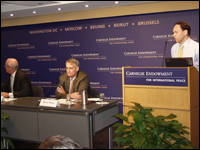Registration
You will receive an email confirming your registration.
IMGXYZ918IMGZYXWith the Beijing Olympics only days away and the Chinese economy continuing its robust expansion, the Chinese people are increasingly optimistic about China’s future and confident about its global image. That is the major finding Richard Wike, Associated Director of the Pew Global Attitudes Project, and Bruce Stroke, columnist for the National Journal and member of the Pew Project, presented at Carnegie from Pew’s 2008 Global Attitudes Survey.
Wike explained that China enjoys the highest level of national satisfaction among all countries surveyed. 82% of Chinese respondents said that they are satisfied with the overall national conditions, particularly on its economic performance, which is a great improvement from the results a few years ago. However, the survey also suggests that the Chinese public is concerned about pressing social issues such as rising prices, the gap between rich and poor, corruption, and environmental problems. There also appears to be less contentment with the level of household income and quality of employment.
China’s economic rise has boosted its national pride and the way it sees its role on the international stage. The majority of Chinese believe that China’s growth has a positive impact on the global economy, but are less willing to identify rival nations like Japan, India and U.S. as partners.
The survey shows an overwhelmingly high level of enthusiasm among the Chinese people about the upcoming Beijing Olympic Games: 96% believe that it will be a successful international event, they place high expectations for Chinese athletes, and believe the Olympics will help to improve China’s international status.
Wike also noted that Western values concerning life style, free markets, and environmental protection have gained growing recognition in China in recent years.
Stroke discussed the disconnect between the way China sees itself and how it is seen by the outside world. Most notably, China’s favorability has slipped significantly in the last year, particularly in Europe. While China’s influence in Africa and Southeast Asia is still strong, there are signs of downward trends in favorability ratings. The world remains concerned about China’s unilateral conduct in international affairs, and is worried about the negative impact of China’s economic and military growth.
China ranks quite low in public perception of its human rights record. But even in the aftermath of the Tibetan turmoil, the world still shows strong approval of Beijing’s hosting of the summer Olympics, and people seem to be comfortable with the idea of another world superpower.
During the questions and answers session, the panel addressed the impact of China’s rise in Australia, Japan and Africa, and the dynamics of the Beijing Olympics. Wike predicted that China may experience an economic slowdown after the Beijing Olympics and he was concerned about the popular reaction towards potential negative Olympics coverage from the Western media. Carnegie’s Douglas Paal, who moderated the event, noted the learning curve that the Chinese leadership has demonstrated in crisis management following the Sichuan earthquake.
